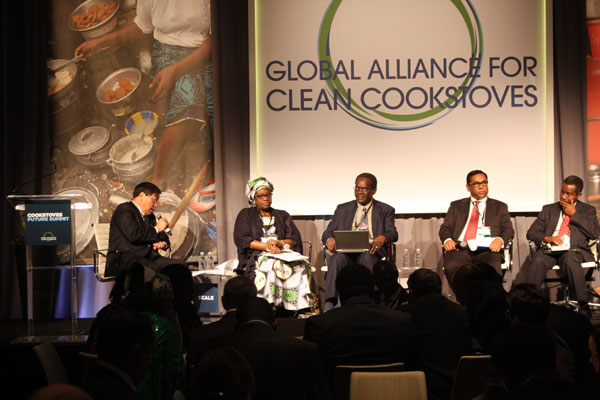

Wang Yanliang (left), director-general of the Rural Energy and Environment Agency of China's Ministry of Agriculture, speaks to the audience on Thursday in New York at an event hosted the Global Alliance for Clean Cookstoves.
Fuel sources such as biomass, coal and wood are relied on by nearly 3 billion people a day for cooking and heating purposes.
"The majority are rural families that use open flame or low-quality stoves, which release toxic pollutants indoors and out," Wang Yanliang, director-general of the Rural Energy and Environment Agency of China's Ministry of Agriculture (MOA) said on Thursday through a translator.
"Having recognized the severity of the problem, the MOA has prioritized the promotion of clean cookstoves as a matter related to the well being of millions of households," he said.
Wang spoke at the Cookstoves Future Summit, an annual event hosted by the Global Alliance for Clean Cookstoves, at the Conrad New York hotel. The Alliance is a global non-profit organization operating under the support of the United Nations Foundation.
The cooking issue is important as countries strive to meet their carbon emission targets. China is the world's top coal producer and consumer, according to the World Coal Association.
"The clean cookstove promotion project in China is one of the largest energy-saving projects in the world, benefitting more than 150 million households and a rural population of nearly 500 million," Wang said. "China has numerous long-term, collaborative exchanges with other developing countries in the area of rural energy, but marketing is critical to scale up development of the clean cookstoves industry.
Wang was joined by four other panelists: Lawrencia Laraba-Mallam, Nigeria's minister of Environment; Omedi Moses Jura, acting deputy director of the Ministry of Environment, Water and Natural Resources of Kenya; Nasrul Hamid, Bangladesh's state minister of Power, Energy and Mineral Resources; and Nii Darko Asante, director of technical regulation for Ghana's Energy Commission.
Hamid told the audience of nearly 200 guests that it is important to educate rural populations in emerging markets about household air pollution.
More than 20 percent of global black carbon emissions are attributed to cookstove smoke, and the use of solid fuels in traditional cookstoves or over open fires is a phenomenon that results in 4.3 million premature deaths a year, data from the alliance showed.
One of the organization's main goals is to promote clean-cooking solutions in Bangladesh, China, Ghana, Guatemala, India, Kenya, Nigeria and Uganda.
With 65 percent of all annual deaths attributed to household air pollution in these countries, Wang said it is imperative to educate as many people as possible.
In China, more than 600 million people are affected by household air pollution, causing more than 1.04 million deaths a year, according to alliance data. India has 780 million people affected by household pollution, contributing to 1.02 million deaths per year.
"Government's main role lies in the cultivation of the market," Wang said. "That includes advances in technology, R&D, capacity-building and any other measures to enhance people's understanding of clean cookstoves."
Copyright ©1999-2018
Chinanews.com. All rights reserved.
Reproduction in whole or in part without permission is prohibited.